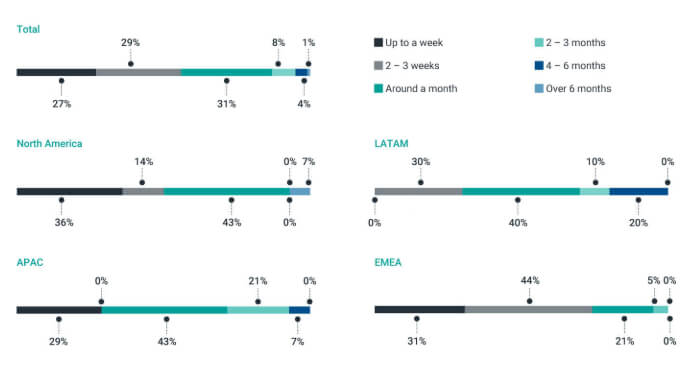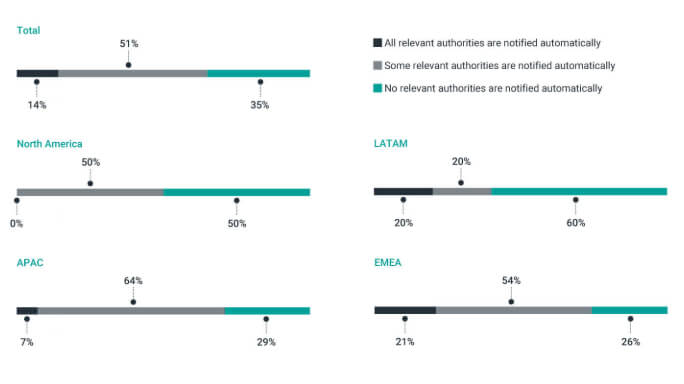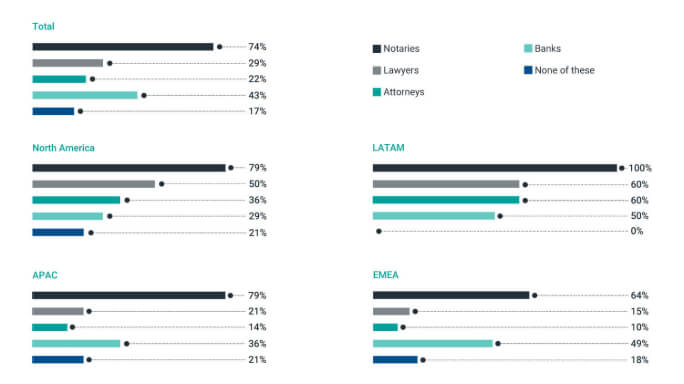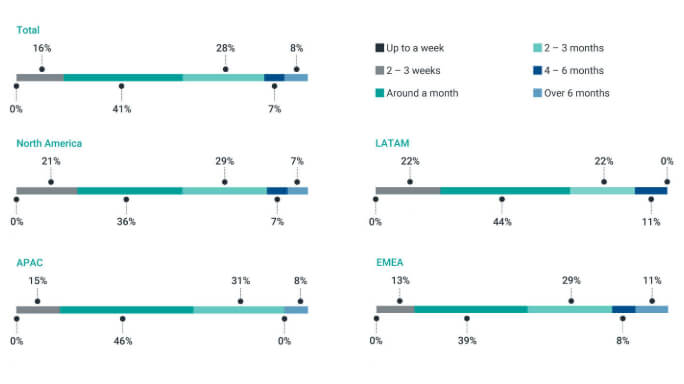GBCI 2021: Focus on incorporation complexity

Incorporation is the first step when expanding business into a new jurisdiction. It is a process which varies significantly across the globe, in terms of both complexity and the time taken. Intricate processes and local cultural norms can cause unnecessary and costly delays to companies as they seek to set up in a new market.
Organisations must plan for the various interactions that may be required with numerous state bodies. It is therefore very important for companies to consider the time that incorporation may take when developing their expansion strategy for a particular target jurisdiction.
The length of the incorporation process can vary significantly
In 27% of the jurisdictions surveyed for TMF Group’s Global Business Complexity Index 2021 (GBCI), incorporation takes less than a week on average. However, this rate rises to around 60% among those jurisdictions ranked as the simplest in this year’s GBCI ranking. This demonstrates that complexity, or lack thereof in locations such as the Netherlands, at the incorporation stage is a strong indicator of how simple or difficult it will be to manage an entity in the target jurisdiction on an ongoing basis.
While it does vary from jurisdiction to jurisdiction, there are overall regional trends in the length of time it takes to incorporate. There is no jurisdiction in South America in which it takes less than a week to incorporate, compared to a third (36%) in North America. At the other end of the scale, it takes four to six months in both Argentina and Venezuela, showing how complex and drawn out the incorporation process is in those markets. As the chart below shows, this kind of timeframe is not necessarily found elsewhere in the world: there are no jurisdictions in EMEA and only 7% in each of APAC and North America in which incorporation takes longer than three months.

Fig. 1 – Private company average incorporation length
Interactions with authorities are a major driver of incorporation complexity
One factor that impacts the length and complexity of the incorporation process is the number of government bodies that must be notified, which can vary widely across jurisdictions. In 35% of markets, processes are streamlined and only one government body must be contacted. This figure rises to 50% in North America, where jurisdictions like the USA, British Virgin Islands, Curacao and Cayman Islands only require contact with one authority. Taking this one step further, this figure rises as high as 90% among those jurisdictions ranked as the easiest for doing business in the GBCI, showing how a streamlined incorporation process is a strong indicator of a simpler, more pro-business climate.
At the other end of the scale, there are jurisdictions that require contact with multiple government bodies. For example, 80% of jurisdictions in South America require interaction with four or more authorities, compared to only 43% in North America, 28% in EMEA and 21% in APAC. This is especially time consuming for companies establishing operations in Brazil and Bolivia, both of which require organisations to contact more than five bodies as part of the incorporation process.
An additional aspect of this form of complexity is the need to notify bodies at multiple ‘levels’ of government during incorporation. In 80% of jurisdictions in South America, companies must notify bodies at both the national and city level. In Brazil and Argentina, bodies at the regional level, in between the national and city levels, must also be notified for incorporation, resulting in companies having to invest significant time and resources into understanding and executing the different processes required to satisfy all of the necessary authorities.
This requirement to notify multiple arms of the state during incorporation is dramatically reduced if the relevant bodies are automatically informed when a company registers for incorporation. This reduces the time and effort required of companies as they don’t have to interact with as many bodies themselves which can often involve a duplication of effort and extensive paperwork. However, this is still a nascent experiment among governments: all of the relevant bodies are currently notified automatically in only 14% of jurisdictions. Approximately half (51%) of jurisdictions have begun this journey by partially digitalising the process, with some (but not all) of the relevant bodies being notified during the incorporation process. This is helpful for companies, but it does mean they can only take advantage of this efficiency if they are aware of which government bodies communicate with one another and which do not.

Fig. 2 – Extent to which authorities are automatically notified when a company is incorporating
Companies need to be aware of the local requirements for experts and professions
As well as interactions with the state, requirements around the involvement of local experts or professional service people can also impact the level of complexity of the incorporation process. Our research for the GBCI focused on four types of expertise that companies can be legally mandated to draw upon. Among these, the most prevalent globally is the use of notaries (74% of jurisdictions), followed by banks (43%), lawyers (29%) and attorneys (22%).

Fig. 3 – Professional parties required at incorporation.
The involvement and coordination of multiple professional parties increases the complexity, and most likely the expense, of incorporation, especially in those jurisdictions, like Bolivia, that require the involvement of all four of the aforementioned parties. There are, however, examples of countries at the other end of the scale: Greece, for instance, only requires that notaries be involved in the process.
Companies need to be aware of the specific professional requirements and processes of the target market when incorporating, and furthermore how these may change over time. For example, whereas many countries have digitalised processes during the Covid-19 pandemic to reduce the need for face-to-face interactions, Italy maintained the requirement of having documents signed in wet ink and duly certified before a notary or public authority.
Setting up a bank account can be an unexpected source of expansion complexity
The incorporation process and the associated factors outlined in this article are not the only potential barriers to getting up and running quickly in a new jurisdiction.
One such example is that setting up a bank account from abroad can be a time consuming and complex process. In fact, while a company can incorporate in less than a week in 27% of jurisdictions, there are no jurisdictions in which a bank account can be set up within that timeframe. In 43% of jurisdictions this typically takes over a month, and in some such as Poland and Bulgaria, it can take longer than six months. This can present an unforeseen barrier to entry in a new market, highlighting the need for a for local knowledge to mitigate complexity.

Fig. 4 – Average time required to set up a bank account by region.
GBCI 2021: Don’t let incorporation complexity hold your business back
As highlighted here, the process of incorporation can vary substantially in length and complexity around the globe. Local processes, requirements to interact with multiple authorities or government bodies and the need to use multiple professional parties can all contribute to a potentially costly and slow process. These factors are impossible to negotiate without deep on the ground knowledge of that jurisdiction and region.
To help businesses navigate the challenges of expanding into new jurisdictions, TMF Group produces the Global Businesses Complexity Index each year. The GBCI provides an authoritative overview of the complexity of establishing and operating businesses around the world, providing analysis of the key trends currently affecting the core areas of your operations.
To help you to bring clarity to the complexities of doing business across borders, download your copy of the GBCI today.





